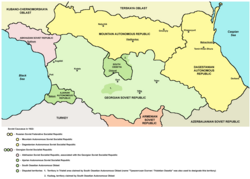Ossetians in Georgia


The Ossetians in Georgia are a group of ethnic Ossetians, settling mainly the central Georgia, the region of Shida Kartli and the district of Borjomi.[1]
History
[edit]Ossetian migration to the Georgian regions began in the 13th and 14th centuries and is believed to be connected to the fall of Kingdom of Alania in the North Caucasus to the Mongols and later to Timur's armies. They retreated into the mountains of the central Caucasus and gradually started moving south, across the Caucasus Mountains into the Kingdom of Georgia.[2][4] In the 17th century, under pressure from the Kabardian princes, Ossetians started a second wave of migration from the North Caucasus to the Kingdom of Kartli.[5]
In 1801, the Kingdom of Kartli-Kakheti was annexed into the Russian Empire. In 19th century, the Ossetians also settled the historical Georgian Trialeti province.[6]
Following the breakdown of the Tsarist regime in Russia, Ossetians allied with the Russian Bolsheviks, fighting a war against the newly independent Menshevik Georgia. Initially Georgia was successful, but in 1921, the Red Army invaded and conquered the country. In 1922 South Ossetian Autonomous Oblast was established within the Georgian Soviet Socialist Republic (SOAO) by the Soviet administration under pressure from Kavburo (the Caucasian Bureau of the Central Committee of the Russian Communist Party).[7] It is believed that the SAOA was established by central Soviet government in exchange for Ossetian loyalty and support of Russian Bolsheviks in their fight against Georgian Mensheviks.[8] This area had never been a separate entity prior to the Russian invasion.[9][10] The drawing of administrative boundaries of the South Ossetian AO was quite a complicated process. Many Georgian villages were included within the South Ossetian AO despite numerous protests by the Georgian population. While the city of Tskhinvali did not have a majority Ossetian population, it was made the capital of the South Ossetian AO.[11][12] In 1922, the recently created South Ossetian Autonomous Oblast claimed the villages, mainly settled by Ossetians in Trialeti as its exclave - to no avail, however.[13][14]
References
[edit]- ^ The Forsaken People: Case Studies of the Internally Displaced by Roberta Cohen, Francis Mading Deng. Brookings Institution Press, 1998. ISBN 0-8157-1513-7, ISBN 978-0-8157-1513-9, page 296. The May 1996 memoramdum (......). Some Ossetians and even some Georgians have returned to South Ossetia, and some Ossetians have also returned to cities elsewhere in Georgia, such as Borjomi an Tbilisi.
- ^ Toal, Gerard (2017). Near Abroad – Putin, the West, and the Contest Over Ukraine and the Caucasus (1st ed.). New York: Oxford University Press. pp. 129–131. ISBN 978-0-19-025330-1. Retrieved 2022-02-06.
- ^ Coene, Frederik (2010). The Caucasus, an introduction (1st ed.). London: Routledge. ISBN 978-0-415-66683-1. Retrieved 2022-02-06.
- ^ Coene, page 151 [3]
- ^ Merab Basilaia (2008). ეთნოსები საქართველოში [Ethnic groups in Georgia] (PDF) (in Georgian). Sak'art'velos Saxalxo Damc'veli. pp. 9, 63. ISBN 978-9941-0-0901-3. Archived (PDF) from the original on 8 August 2014. Retrieved 3 August 2014.
- ^ "Ethnic Minorities in Georgia".
- ^ ОСЕТИНСКИЙ ВОПРОС [Ossetian Question] (in Russian). Tbilisi. 1994. pp. 153–161. Archived from the original on 21 June 2014.
{{cite book}}: CS1 maint: location missing publisher (link) - ^ "Russian Federation: Legal Aspects of War in Georgia". Library of Congress. Archived from the original on 16 July 2014.
- ^ "Russian Federation: Legal Aspects of War in Georgia". Library of Congress. Archived from the original on 16 July 2014.
- ^ De Waal et al, Beyond Frozen Conflict, chapter 6. South Ossetia Today
- ^ Ossetian Question 1994, pp. 153–161.
- ^ Цхинвали. eleven.co.il (in Russian). Archived from the original on 1 December 2017. Retrieved 29 November 2017.
- ^ (in Russian)Tsutsiev, Artur (2007). Atlas etnopoliticheskoy istorii Kavkaza (1774-2004). Evropa. ISBN 978-5-9739-0123-3.
- ^ (in Russian) Map with claimed territories
